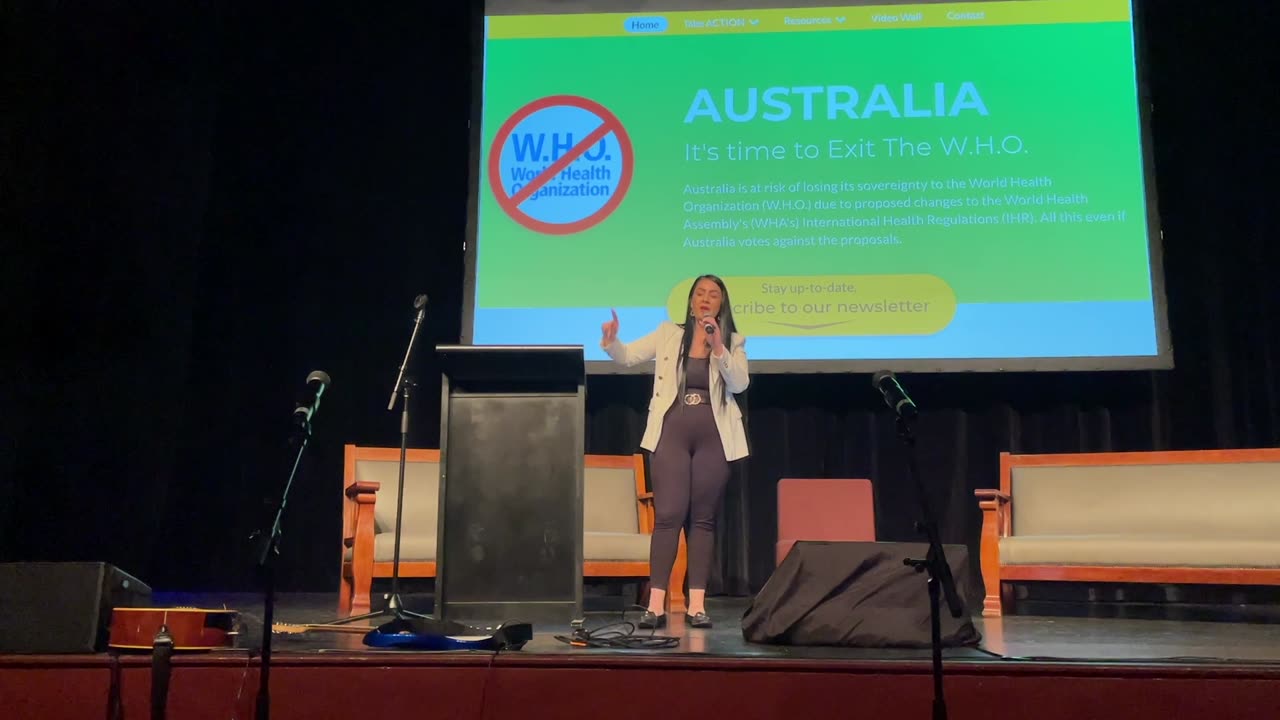Premium Only Content

Maria Zeee - Do you know what the World Health Organisation is up to and how it affects you?
Do you know what the World Health Organization is up to and how it affects you?
This was recorded at the National Free Media Summit on 11 November 2023, Adelaide, South Australia.
Please become involved in the problem we, as individuals and as a country, will face if the amendments to the International Health Regulations and the proposed WHO Pandemic treaty are accepted - sign up to support the latest time sensitive initiative here - https://mysaymatters.com.au/.
77th World Health Assembly (WHA) meeting to accept these proposals is scheduled for May 2024!
- https://australiaexitsthewho.com/
- https://www.standupnowaustralia.com.au/
- https://amps.redunion.com.au/news/open-letter-australia-who-involvement
Please continue to read below for a short summary.
Currently there are two concerning pieces of proposed legislation under consideration by the World Health Organisation (W.H.O.)
1. Proposed amendments to International Health Regulation (2005) (IHR- 2005) and
2. The current working draft of the Pandemic Treaty is known as the ‘Zero Draft’
The Pandemic Treaty is a parallel and complimentary entity to the IHR-2005. The IHRs are a broad framework for international health cooperation and are adopted by member countries and led by the World Health Assembly (WHA) the governance body of the W.H.O.
Both these instruments come as a result of strategic planning by the W.H.O. to control people’s movement and decide what is in the best interest of the collective. When we do what is in the best interest of the individual, society thrives. When we focus on the collective, there is discrimination against individuals regardless of opposing information.
Top 10 key concerns of the proposed amendments to the IHR-2005 referenced by article numbers.
1. Change from Advisory to Mandatory proclamations: Change the overall nature of the World Health Organization from an advisory organization that merely makes recommendations to a governing body whose proclamations would be legally-binding. (Article 1 and Article 42)
2. Potential Rather than Existing or Emerging Emergencies: Greatly expand the scope of the International Health Regulations to include scenarios that merely have a “potential to impact public health.” (Article 2)
3. Seeking to remove ‘respect for dignity, Human Rights and fundamental freedoms of people’: (Article 3)
4. Allocation Plan/ Power Over Resources: The W.H.O. Director General would decide “allocation plan for health products” and the means of production requiring countries to supply pandemic response products as directed. (Article 13A)
5. Mandatory Medical Treatments: Authority to require medical examinations, proof of prophylaxis, proof of vaccine and to implement contact tracing, quarantine and treatment. (Article 18)
6. Global Health Certificates: Institute a system of global health certificates in digital or paper format, including test certificates, vaccine certificates, prophylaxis certificates, recovery certificates, passenger locator forms and a traveler’s health declaration. (Articles 18, 23, 24, 27, 28, 31, 35, 36 and 44 and Annexes 6 and 8)
7. Loss of Member Nation Sovereignty: Would empower the Emergency Committee to override decisions made by sovereign nations regarding health measures and would make the Emergency Committee’s decisions final. (Article 43)
8. Unspecified, Potential Large Financial Costs: Redirect unspecified billions of dollars to the Pharmaceutical Hospital Emergency Industrial Complex with no accountability. (Article 44A)
9. Censorship: Greatly expand the World Health Organization’s capacity to censor what they consider to be mis-information and dis-information. (Annex 1, page 36)
10. Obligations of Duty to Cooperate: Creates an obligation to build, provide and maintain IHR infrastructure at points of entry. (Annex 10)
Top 10 key concerns of the proposed formation of a Pandemic Treaty referenced page numbers.
1. Control: Three separate times the W.H.O. asserts its desire to gain additional authority by usurping the sovereignty of the member nations. (Pages 4, 12 and 22)
2. Common but differentiated responsibilities: Each nation has only one vote, and all member nations would be legally bound but some nations would be required to do and provide more than others in unspecified ways. (Page 11)
3. WHO global pandemic supply chain and logistics network: The WHO would be empowered to determine, control and direct the global supply of pharmaceutical products and all nations would be legally obligated to obey their dictates. (Page 13)
4. Speed up regulatory approval of drugs: Nations would be obligated to decrease the time required to approve new drugs, regardless of issues regarding safety and effectiveness. (Page 15)
5. Support for ‘Gain of Function’ research: Nations would be encouraged to engage in “innovative research and development for addressing novel pathogens” while ensuring that regulatory standards “do NOT create any unnecessary administrative hurdles for research.” (Page 16)
6. Pathogen Access and benefits sharing system: The W.H.O. wants control of “all pathogens with pandemic potential, including their genomic sequences, as well as access to benefits arising there from.” And to receive “real-time access to 20% of the production of... pandemic-related products.” (Pages 17-18)
7. Attempts to justify restriction of unalienable human rights: The W.H.O. is attempting to rebrand isolation, restrictions and quarantines as “Protection of Human Rights.” (Page 21)
8. Censorship: Increase funding to “tackle false, misleading, misinformation or disinformation,” “managing infodemics through... social media” and “to counteract misinformation, disinformation and false news.” (Page 23)
9. Large unspecified costs: The W.H.O. would require tens of billions of dollars to be spent during inter-pandemic times on products that would provide dubious health benefits but consistent profits for the Pharmaceutical Hospital Emergency Industrial Complex. (Pages 25-26)
10. Additional bureaucracy: The Conference of the Parties (COP) would create another enormous bureaucracy to be ruled over by two Presidents and 4 Vice-Presidents. (Pages 26-27)
Please become more informed, share this information and have conversations with your members of parliament, work colleagues, family, friends, neighbors and strangers.
Online Links:
https://opiniojuris.org/2023/02/27/the-proposed-amendments-to-the-international-health-regulations-an-analysis/
https://jamesroguski.substack.com/p/australia
https://jamesroguski.substack.com/p/the-final-report-of-the-international
https://wireamerica.org/2022/05/who-international-health-regulation-amendments-defeated-in-geneva/
https://worldcouncilforhealth.org/campaigns/stop-the-who/stopthewho-oppose-international-health-regulation-amendments/
https://AustraliaExitsTheWHO.com
Revision of IHR in 2004 - https://www.asil.org/insights/volume/8/issue/8/revision-world-health-organizations-international-health-regulations
-
 1:02:24
1:02:24
Man in America
8 hours agoThe Final Battle: Nanotech, Transhumanism & the War for Your Soul w/ Dr. Ed Group
29.5K3 -
 39:56
39:56
Sarah Westall
2 hours agoUpcoming World Wide Economic Collapse/Deep Recession & What the Big Money is Doing w/ Ed Dowd
21.6K4 -
 2:52:55
2:52:55
Barry Cunningham
4 hours agoIT'S MOVIE NIGHT WITH BARRY!
34.5K23 -
 31:05
31:05
The Why Files
2 days agoPeru's Most Terrifying Mystery | The Face Peelers
40.3K41 -
 1:32
1:32
Gaming on Rumble
12 hours agoWhat is the Rumble Creator Program?!?! | Lvl UP
29.1K4 -
 1:50:49
1:50:49
Flyover Conservatives
23 hours ago9/11 on Steroids: What’s Coming This Fall? - Bo Polny | FOC Show
40.6K7 -
 1:01:28
1:01:28
Precision Rifle Network
9 hours agoS4E27 Guns & Grub - Let's Talk About Gas Guns
21.8K1 -
 59:29
59:29
The Charlie Kirk Show
5 hours agoTHOUGHTCRIME Ep. 96 — The Great Flag Burning Debate
48.5K34 -
 57:56
57:56
The Mel K Show
5 hours agoMel K & General Mike Flynn | Betrayal of a Nation: Soros’ NATO World Order | 8-28-25
30.3K27 -
 2:13:31
2:13:31
Joker Effect
4 hours agoInterviewing BEN JAMMINS! A personality with over 1 BILLION gif views. Let's give him a warm welcome
15.6K1